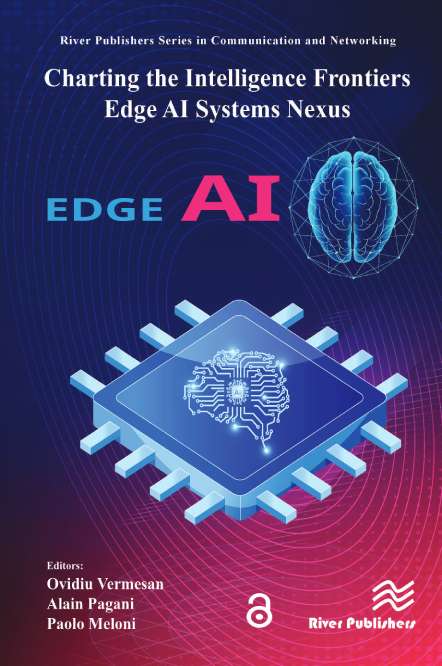Communications and Networking
Charting the Intelligence Frontiers Edge AI Systems Nexus
Editors:
Ovidiu Vermesan, SINTEF, Norway
Alain Pagani, German Research Center for Artificial Intelligence, Germany
Paolo Meloni, University of Cagliari, Italy
ISBN: 9788743808848 (Hardback) e-ISBN: 9788743808831
Available: October 2025
Collectively, the book serves as a reference for the field, capturing the current state-of-the-art and anticipating future trends in hyperautomation, generative AI, connectivity, autonomy, and security mesh architectures. Whether you are seeking in-depth technical knowledge, inspiration for novel applications, or a strategic overview of the edge AI landscape, you will find invaluable insights from thought researchers and practitioners at the forefront of the field of edge AI.
A brief overview of each of the twenty chapters is provided below, highlighting the research and applications of edge AI that underscore the book’s commitment to both technological and societal impact.
Edge AI Systems Verification and Validation: This chapter explores the challenges of verifying and validating complex edge AI systems, which integrate hardware, software, and data. It proposes a structured framework that combines model- and data-driven engineering to ensure these systems are reliable, robust, and meet regulatory standards.
Chapter 1: Edge AI Systems Verification and Validation
by Ovidiu Vermesan, Alain Pagani, Roy Bahr, Marcello Antonio Coppola, Giulio Urlini
Chapter 2: Pioneering the Hybridization of Federated
Learning in Human Activity Recognition
by Alfonso Esposito, Yasamin Moghbelan, Ivan Zyrianoff,
Leonardo Ciabattini, Federico Montori, Marco Di Felice
Chapter 3: Edge Intelligence Architecture for
Distributed and Federated Learning
Systems
by Pierluigi Dell’Acqua, Lorenzo Carnevale, Massimo Villari
Chapter 4: Challenges and Performance of SLAM
Algorithms on Resource-constrained
Devices
by Calvin Galagain, Martyna Poreba, François Goulette
Chapter 5: Designing Accelerated Edge AI Systems
with Model Based Methodology
by Petri Solanti, Russell Klein
Chapter 6: Edge AI Acceleration for Critical Systems:
from FPGA Hardware to CGRA Technology
by Pietro Nannipieri, Luca Zulberti, Tommaso Pacini, Matteo Monopoli,
Tommaso Bocchi, Luca Fanucci
Chapter 7: Model Selection and Prompting Strategies
in Resource Constrained Environments for
LLM-based Robotic System
by Toms Eduards Zinars, Oskars Vismanis, Peteris Racinskis,
Janis Arents, Modris Greitans
Chapter 8: Optimising ViT for Edge Deployment:
Hybrid Token Reduction for Efficient
Semantic Segmentation
by Mathilde Proust, Martyna Poreba, Calvin Galagain,
Michal Szczepanski, Karim Haroun
Chapter 9: Recent Trends in Edge AI: Efficient Design,
Training and Deployment of Machine
Learning Models
by Mark Deutel, Maen Mallah, Julio Wissing, Stephan Scheele
Chapter 10: Scalable Sensor Fusion for Motion
Localization in Large RF Sensing Networks
by Fetze Pijlman
Chapter 11: Multi-Step Object Re-Identification on Edge
Devices: A Pipeline for Vehicle
Re-Identification
by Tomass Zutis, Peteris Racinskis, Anzelika Bureka, Janis Judvaitis, Janis Arents, Modris Greitans
Chapter 12: A TinyMLOps Framework for Real-world
Applications
by Mattia Antonini, Massimo Vecchio, Fabio Antonelli
Chapter 13: Transfer and Self-learning in Probabilistic
Models
by Fetze Pijlman
Chapter 14: A Novel Hierarchical Approach to Perform
On-device Energy Efficient Fault
Classification
by Devesh Vashishth, Julio Wissing, Marco Wagner
Chapter 15: Discovering and Classifying Digital and
Wooden Industries Products’ Defects at the
Edge by a Yolo/ResNet-based Approach and
Beyond
by Robin Faro, Alessandro Strano , Francesco Cancelliere
Chapter 16: Conscious Agents Interaction Framework
for Industrial Automation
by Polina Ovsiannikova, Valeriy Vyatkin
Chapter 17: Neuromorphic IoT Architecture for Efficient
Water Management
by Mugdim Bublin, Heimo Hirner, Antoine-Martin Lanners,
Radu Grosu
Chapter 18: Online AI Benchmarking on Remote Board
Farms
by Maïck Huguenin, Baptiste Dupertuis, Robin Frund,
Margaux Divernois, Nuria Pazos
Chapter 19: Optimising Neural Networks for Water
Stress Prediction in Europe: A Sustainable
Approach
by Laura Sanz-Martín, Manal Jammal, Javier Parra-Domínguez
Chapter 20: The Accountability Strikes Back:
Decentralizing the Key Generation in
CL-PKC with Traceable Ring Signatures
by Varesh Mishra, Aysajan Abidin, Bart Preneel
